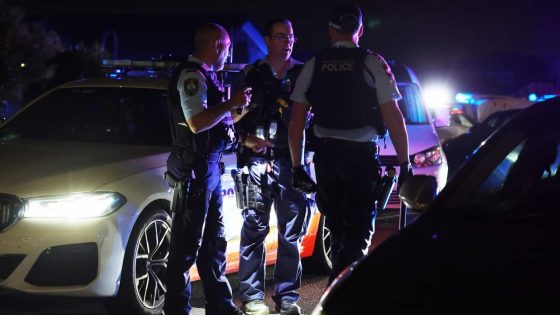Australia’s three main Islamic groups were left in the dark about police raids in western Sydney that came in the wake of a recent stabbing at a church, a peak Muslim body says.
The Australian Federation of Islamic Councils (AFIC), the Australian National Imams Council (ANIC), and the Lebanese Muslim Association (LMA), confirmed to SBS News on Thursday they were only told about the raids hours after they began — and after the media was alerted.
More than 400 federal and NSW police officers, which were part of a joint counterterrorism operation formed last week.
Police arrested seven minors who, they alleged, were associates of a 16-year-old charged with a terrorism offence over the knife attack that injured and injured priest Isaac Royel.
Five youths aged between 14 and 17 years old with a range of terrorism offences and were due to appear in Parramatta Children’s Court on Thursday.
Five others, three minors and two men, are assisting with police inquiries.
The raids came in the wake of a stabbing at Christ the Good Shepherd Church in southwestern Sydney last week. Source: AAP / Bianca De Marchi
NSW Police and the Australian Federal Police (AFP) told reporters in a joint press conference on Wednesday at 4pm that police had spoken to community leaders about the operation.
“Senior members of the AFP and our community liaison teams have today held discussions with faith communities who we value and respect”, AFP Deputy Commissioner Krissy Barrett said on Wednesday.
“Our relationships are very important, and we never take them for granted.”
NSW Police Deputy Commissioner David Hudson said police were “in the process of engaging with our local community leaders to ensure calm across those suburbs in south-western Sydney”.
But Bilal Rauf, a spokesperson from ANIC, on Thursday told SBS News the raids came “as a shock” and said the three groups were not consulted, but rather “informed”, about the raids.
“It is concerning that, before any engagement with community organisations and leaders, the authorities seemingly engaged with the media,” he said.
NSW Police Deputy Commissioner David Hudson said police are engaging with community leaders in western Sydney. Source: AAP / Dan Himbrechts
Rauf said the safety of Australians was paramount but believed police had not handled the matter sensitively.
“Such a high-handed police approach towards teenagers without and involvement of community elders and organisations or social workers risks entrenching and promoting violence amongst disillusioned youth; alienating communities; and creating distress and anxiety about the attempt to conflate what is occurring with religion, rather than misguided ideology,”he said.
AFIC’s president Dr Rateb Jneid said he was conscious of community concerns about the operation.
“We reject trial by speculation,” he said in a statement.
Last week’s stabbing triggered riots outside the Assyrian Orthodox Christian Church, where more than 50 police officers were injured and several patrol cars were damaged. Seven men have since been charged over their involvement in the riots.
As fears of reprisals were heightened at local mosques over the past week, faith leaders including the three Muslim peak bodies engaged closely with police and political leaders to ensure community calm.
“A week ago we sat here with interfaith, with other religions, the politicians, police, and we spoke openly about the need for us to be united and socially cohesive,” said LMA secretary Gamel Kheir.
“What happened yesterday flies in the face of that.”
Kheir said community groups did not expect police to share intelligence with them, but they did want to know if there was “a heightened sense of alarm” so they could act accordingly.
“So we can create a bit of harmony within our community,” he said.
An AFP spokesperson said: “The AFP takes pride in its ongoing relationship with culturally and linguistically diverse (CALD) communities and keeping people safe through proactive community engagement.
“The AFP Community Liaison Teams engage directly with communities across all religious, cultural and ethnic backgrounds to help build productive relationships, establish police legitimacy and understand community sentiment and issues of concern.”



